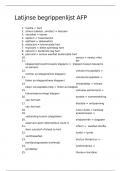Reason to create the EU
EU was created to ensure peace by tackling nationalism and to avoid events such as WOII.
1. Peace: to ensure peace in the European continent.
2. Prosperity: efficient allocation of production factors by creating a common market. By
working together and opening borders you can have efficient allocation of factors of
production.
- Six countries started ECSC: France, Germany, Belgium, Luxembourg, Italy and the
Netherlands.
Maastricht Treaty: pillar system -> Lisbon Treaty 2009 (system we have today with TEU and
TFEU).
Intergovernmental vs. supranational
Two methods of working together on international level
- Intergovernmental: sovereignty of states: states are sovereign and equal and there is no
higher power. States work together to make decisions and you cannot force something upon
other states.
- Supranational: there is a higher power that can bind the states (consent to be bound:
as a state you give powers to the EU).
The EU is partly intergovernmental by safeguarding the interests of MS and partly
supranational by not looking at the interest of an individual MS but at the interest of the EU
as a whole.
Five main institutions
1. European Commission: works in the interest of the EU.
2. Council of Ministers: works in the interest of the member states.
3. European Parliament: works in the interest of the EU citizens
Link between these: they are the legislative power and they interact in legislative procedure.
4. European Council: not part of legislation procedure. It sets the priorities of the EU and
determine were the EU is going. Works in the interest of everyone.
5. The Court of Justice of the EU: checks everything that happens within the EU.
European Commission: guardian of the EU: works in the interest of the EU
Right of initiative: EC is the only institution that can propose legislation.
Composition 17(5): president + elected individual from each MS. Even though you are
elected from a MS, you do not protect the interest of your MS because each commissioner
has its own field that they represent. Commissioners are chosen by the European
Parliament 17(7) TEU. The president determines in which direction EC goes and he is also
part of the European Council.
- Competences: legislative (right of initiative), administrative (EC has to enact legislation and
implement it), executive (EC can give subsidies) and judicial (if MS do not implement or
violate EU law then EC can take case to court).
- Decision making: College of Commissioners.
- Supranational: EC act for EU as a whole, and can check whether MS are following up
obligations of EU law 258 and 259 TFEU.
Council of Ministers: share legislative power with the European Parliament: work in the
interest of MS
Composed of the ministers of MS. From origin it was the only institution that had legislative
powers but now it has to share its powers with the EP. Every six months there is a different
, president of the Council.
- Composition 16(2) TEU 16(6) TEU:
- Competences 16(1) TEU
- Decision making 16(4) TEU and 238 TEU: the Council can make decisions by unanimity
(all MS have a veto), absolute majority (half MS+1), qualified majority (art 4: at least
55% of 28 + at least 15 MS + yes voters at least 65% of the entire population).
- Supranational/intergovernmental depends on the voting. Unanimity – intergovernmental,
absolute majority and qualified majority – supranational.
European Parliament: representation of EU population
EP is involved in the ordinary legislation procedure. EC proposes and EP has to approve.
They can both make amendments. EP reflects interest of all EU citizens.
- Composition 14(2) TEU.
- Competences 14 TEU, 226-228, 264, 294, 314 TFEU: legislative (ordinary legislative
procedure), dismiss/appoint commissioners, supervisory (make committees to inspect
EC), budgetary (vote on budget).
- Decision making 231 TFEU: simple majority, one-third being present
- Supranational: EP protects right of all EU citizens.
EP powers have increased over time:
1. Increase in legislative powers:
- Veto over delegated acts 290 TFEU
- Increased role in the context of EU external action
2. Dismissal and appointment powers:
- Right to participate in appointment of EC
- EP appoints President of EC 14(1) and 17(7) TEU
3. Supervisory power:
- Appointment of Ombudsman by EP 228 TFEU.
European Council: long term policy of the EU
- History: originally not one of the formal institutions
- Composition 15(2) and 15(5) TEU: made up of the heads of states
- Competences 15(1) TEU
- Decision making 15(5) TEU
- Supranational
Court of Justice of the EU
History: more and more cases were brought to the CJEU and therefore the General Court
was created as a court of first instance. When you appeal then you go to the CJEU. The
General Court was meant to help the CJEU with workload.
- Composition 19 TEU: Court of Justice, general court, specialized courts. ECJ!!
MS propose judges and there is one judge from each MS in the ECJ.
- Competences
- Decision making: behind closed doors, they do not have concurring or dissenting
opinions.
- Supranational: CJEU is an institution standing above the MS and they take the interest of
the EU as whole into account.










